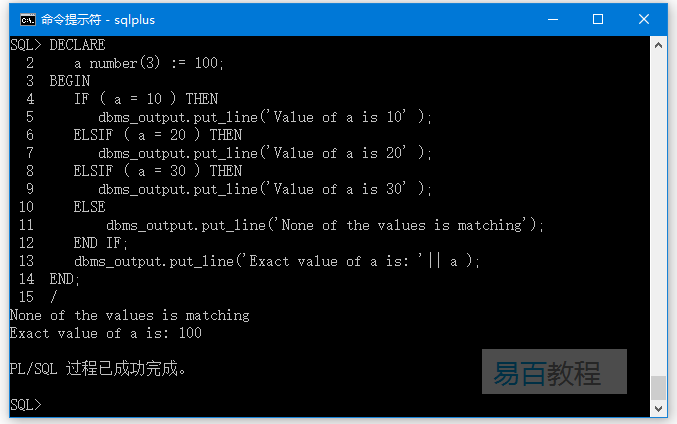请注意,本文编写于 822 天前,最后修改于 822 天前,其中某些信息可能已经过时。
在PL/SQL中,IF-THEN-ELSIF语句允许在多种选择之间进行选择。IF-THEN语句后面可以有一个可选的ELSIF ... ELSE语句。 ELSIF子句可用于添加附加条件。
使用IF-THEN-ELSIF语句时需要注意几点。
- 需要看清楚,它是
ELSIF,并不是ELSEIF。 IF-THEN语句可以有零个或一个ELSE,它必须在ELSIF之后。IF-THEN语句可以有零或多个ELSIF,它们必须在ELSE之前。- 一旦有一个
ELSIF条件测试成功,其余的ELSIF或ELSE都不会再被测试。
语法
PL/SQL编程语言中的IF-THEN-ELSIF语句的语法是 -
IF(boolean_expression 1)THEN
S1; -- Executes when the boolean expression 1 is true
ELSIF( boolean_expression 2) THEN
S2; -- Executes when the boolean expression 2 is true
ELSIF( boolean_expression 3) THEN
S3; -- Executes when the boolean expression 3 is true
ELSE
S4; -- executes when the none of the above condition is true
END IF;示例
参考以下示例代码 -
SET SERVEROUTPUT ON SIZE 1000000;
DECLARE
a number(3) := 100;
BEGIN
IF ( a = 10 ) THEN
dbms_output.put_line('Value of a is 10' );
ELSIF ( a = 20 ) THEN
dbms_output.put_line('Value of a is 20' );
ELSIF ( a = 30 ) THEN
dbms_output.put_line('Value of a is 30' );
ELSE
dbms_output.put_line('None of the values is matching');
END IF;
dbms_output.put_line('Exact value of a is: '|| a );
END;
/当上述代码在SQL提示符下执行时,它会产生以下结果 -

